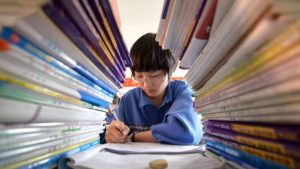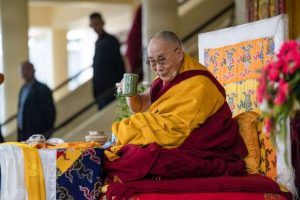
It should be no surprise to any of us to note that, during the last two years, people have increasingly turned toward what we call “news” to inform themselves of day-to-day changes. With not only the pandemic, the economy, and politics in flux, but everything else besides, we consult the oracles of social media and various news outlets, blogs, online journals, and more to orient ourselves to what we perceive to be happening: happening in our communities, and in our world at large. But it is important to recognize that although there are diverse sources of “news,” all of them are tailored and cultivated as particular ways of framing and reframing events. In other words, stories told by humans tend to be highly subjective.
What kind of data is used? Whose point of view is featured or diminished? What is censored? What is highlighted? News of any kind, being part of human communication, is a form of storytelling. It is not that it is necessarily fictional, but it is dependent on place, person, and purpose. And so, I want to turn our attention to other forms of storytelling that may be just as important and even more nourishing and healing for our psyches, souls, or spirits during these incredibly challenging times.
Storytelling, whether intentionally fictional or based on “reality,” history, or personal stories, serves a purpose of connecting people to one another. Stories can inform, nourish, heal, and increase social cohesion or the social fabric of society. Society, of course, is a broad term and so is subject to the interpretation of the author or writer of a particular story and in turn, the reading audience. Having written one book of nonfiction based on research and personal stories, I am quite interested in authoring a book of memoir-based stories to capture my own experiences in life.

I find this idea quite daunting, and the deep underlying question of “why would anyone want to read this?” resonates and keeps me from diving in headfirst. However, when I decided that it might be good to record a few simple recollections from my past, I started to produce short stories that might at the very least entertain or capture the imagination of readers, simply for their enjoyment. We underestimate the simple joys of reading or writing, or creating artwork or music, especially in these times. Art is the one thing that truly heals individuals, collectives, and societies during the most intense times of war, famine, starvation, disease, and alienation.
In offering you one simple story from my past, I hope it will inspire you to write or draw or sing or compose or move a story of your own; something that can really inspire or remind you of your own basic goodness and connection. And it will be something that you can share with others to inspire them in turn. These simple acts of generosity and kindness should not be underestimated. In terms of healing within our friend group or family, neighborhood, local community, or nation, and through online media, you can reach a larger wider audience.

Storytelling and many other creative arts have been proven time and again to be beneficial in healthcare settings for groups and individuals suffering from all kinds of conditions, such as chronic pain or disease, anxiety, depression, and many other disorders. Storytelling can reconnect one not only to the past but to the present moment. Imaginative rumination in a positive sense counteracts anxious or negative rumination. It is also a way of sharing other parts of ourselves with which those in our immediate sphere may not be familiar, and may in fact be surprised by the depth of our experience or particulars of our life path. This may also jog their memory and remind them of what they can also offer from their inner resilience, creativity, and life experiences.
As writer Julia Hotz conveys in an article on storytelling:
Often . . . storytellers don’t know why they choose to tell certain stories, or what impact those stories create, until after they’ve shared with the group . . . in one recent example: when a nurse who had typically worked with first-time mothers and babies could no longer make home visits during the pandemic, she told a seemingly unrelated story about a small bird she rescued from outside her window. ‘She hadn’t realized it before, but in telling this story, she’s making all these connections about how she took care of this bird in the same way she used to take care of her patients and their babies. . . . She’s recognizing what she’s lost over the past 18 months, and how she’s coped.’*
Storytelling has power, pathos, and the ability to transcend perceived barriers. And so, I offer you one of mine:
of Motos and Peach Pies,
a gift from one July to another
by Sarah C. Beasley
15 July 2021

It was a small plane, maybe a 10-seater. Just a quick hop from Montreal to Quebec City. But the afternoon was stormy, and the plane kept lurching in that awful, stomach-drop way. I thought, “this is it.” I eyed the flight attendant, an appealing Quebecois, my pick for whose arm to seize if we nose-dived to certain death. But I knew that, strapped to my seat, I would never reach him in time to grab his muscled arm as he stood calmly panicking in the fore-galley. We made it through adrenalin thunder clouds to land exhausted but whole. Since then, I always designate a stranger on flights as my arm-clutchee, just in case.
Summer was in full bloom. The house stood hours northeast of Quebec City, near Pointe-au-Pic, perched above the St. Lawrence River. My professor had flown me up to walk her enormous Siberian Husky. It was the summer after my junior year in college, when I had walked her dog multiple times a week. She had had polio as a child or would have walked him herself, her beloved giant. Between walks, I played tennis with the various children’s nannies on those humid, late mornings—a game I’ve never mastered, though I adore ping pong, a blood sport.
I shared a sunny, wood-paneled room with two nannies at the summer house, with its storybook views and heirloom peach harvest. Local blueberries and farm cream were in abundance. The peaches were something to behold—gently squeeze, inhale their scent, and craft into steamy, lattice-topped pies, chin-dripping with golden nectar. I have not met a superior peach since.

Walking above the sultry river one afternoon, a man on a motorcycle passed by. He turned and rode slowly back my way, stopping to check me out. We chatted. He offered me a joy ride and I accepted. I know what you are thinking, “how dangerous, how irresponsible, he could have . . . etc.” But no. In simpler times, in some cultures, there are places—all lush and peach-juice fragranced—riding on his moto, wind in my helmeted hair, I was fine. We rode together now and then. He shared local lore and geo-history. Flirty yes, dramatic no. It really was something to ride those curving country roads, swaying with him and the bike as one, with no destination.
Though long ago, my St. Lawrence summer remains a perfect one—tennis girl comrades, naps on sunlit lawns, our vantage over regal river, and guileless rides with my handsome Quebecois stranger. In that fertile land, there were no ambitions, just a daily breeze on my limbs, scent of tree foliage, wrestling the dogs, sharing slow meals with my professor’s family.
There is no point to this story. No fulcrum of tension. Neither climax nor denouement. Any angst from that peach-perfect, dog-love summer has conveniently slipped my mind. Perhaps my capacity to retroactively Walt-Whitman my experience is beauty enough. To reclaim and relive those pies, courts, verdant riverbanks, and moto rides amidst present, complex stressors, is a true high-summer gift, twice-received.”

May you remember your inner child who loves to run free with the imagination, hear stories, tell stories, and share stories in community for group joy and healing. May you feel creative and may you be well!
* How Strangers Use Storytelling to Help Others—and Themselves (Time)
See more
The Healing Power of Storytelling (Coming to the Table)
Related features from BDG
Book Review: The Taming of the Demons: From the Epic of Gesar of Ling
The Poetry of Compassionate Wisdom
Yasodhara: Retellings and Hagiographies of the Buddhist Feminine
The Fiction of the Self: Ruth Ozeki












